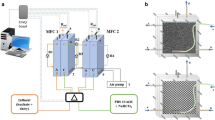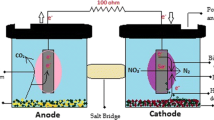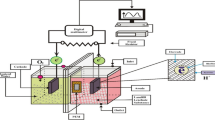Abstract
Coconut processing industries generate a huge amount of wastewater, mainly coconut water from mature coconuts and wash water. Due to the high concentration of organic compounds in waste coconut water, it produces the most pollution even in small quantities compared to the overall effluent generated. Many small/medium-scale processing units discharge waste coconut water directly into the soil or drain it without treatment, polluting soil, groundwater, and surface water. Microbial fuel cells (MFCs) are bioelectrochemical reactors that generate electricity by biodegradation of organic compounds. The present study examines the ability of a dual-chambered MFC, to reduce organic contamination in wasted coconut water. Given the importance for achieving COD removal and bioenergy output, the various influential factors such as KMnO4 concentration as catholyte, catholyte pH, electrode material, and anode configurations were studied. At the best KMnO4 concentration of 2000 mg/L at pH 5, MFC produced a COD removal efficiency of 51.85%, with a maximum power density of 5.5 W/m3 using aluminium electrodes within 102 h of detention period. When the study proceeded with spatially distributed carbon cloth electrodes in anolyte, COD removal efficiency had improved up to 62.72% with a maximum power density of 6.5 W/m3.









Similar content being viewed by others
Availability of data and materials
All data generated or analysed during this study are included in this published article and its supplementary information files.
Code availability
Not applicable.
References
Akman D, Ozdemir S, Cirik K, Ozkaya B, Cinar O (2014) Effect of some operational parameters in fed-batch microbial fuel cells for electricity generation. Res J Chem Environ 18(3):87–93
Ali AH, Mussawy HAA, Hussein MJ, Hamadi NJ (2019) Comparison between conventional and modified microbial fuel cell for wastewater treatment and electricity generation. Int J Environ Sci Technol 16:8141–8150. https://doi.org/10.1007/s13762-019-02355-x
Archana P (2019) An analytical study of Indian agriculture crop production and export with reference to wheat. Adv Manag 12(1):75–78
Ballesteros F, Vuong TH, Secondes MF, Tuan PD (2016) Removal efficiencies of constructed wetland and efficacy of plant on treating benzene. Sustain Environ Res 26(2):93–96. https://doi.org/10.1016/j.serj.2015.10.002
Capodaglio AG, Olsson G (2020) Energy issues in sustainable urban wastewater management: use, demand reduction and recovery in the urban water cycle. Sustainability 12(1):1–17. https://doi.org/10.3390/su12010266
Chanakya HN, Khuntia HK, Mukherjee N, Aniruddha R, Mudakavi JR, Thimmaraju P (2015) The physicochemical characteristics and anaerobic degradability of desiccated coconut industry waste water. Environ Monit Assess 187:772. https://doi.org/10.1007/s10661-015-4991-7
Chen F, Zeng S, Luo Z, Ma J, Zhu Q, Zhang S (2019) A novel MBBR–MFC integrated system for high-strength pulp/paper wastewater treatment and bioelectricity generation. Sep Sci Technol 55(14):2490–2499. https://doi.org/10.1080/01496395.2019.1641519
Das A, Mishra S (2019) Complete biodegradation of azo dye in an integrated microbial fuel cell-aerobic system using novel bacterial consortium. Int J Environ Sci Technol 16:1069–1078. https://doi.org/10.1007/s13762-018-1703-1
Das I, Ghangrekar M, Satyakam R, Srivastava P, Khan S, Pandey H (2020) On-site sanitary wastewater treatment system using 720-L stacked microbial fuel cell: case study. J Hazard Toxic Radioact Waste 24(3):04020025. https://doi.org/10.1061/%28ASCE%29HZ.2153-5515.0000518
Dong Y, Qu Y, He W, Du Y, Liu J, Ha X, Feng Y (2015) A 90-liter stackable baffled microbial fuel cell for brewery wastewater treatment based on energy self-sufficient mode. Biores Technol 192:66–72. https://doi.org/10.1016/j.biortech.2015.06.026
Firdous S, Jin W, Shahid N, Bhatti Z, Iqbal A, Abbasi U, Ali A (2018) The performance of microbial fuel cells treating vegetable oil industrial wastewater. Environ Technol Innov 10:143–151. https://doi.org/10.1016/j.eti.2018.02.006
Flimban SGA, Ismail IMI, Kim T, Oh SE (2019) Overview of recent advancements in the microbial fuel cell from fundamentals to applications: design, major elements, and scalability. Energies 12(17):3390. https://doi.org/10.3390/en12173390
Gomes LM, Duarte JLS, Pereira NM, Huitle CAM, Tonholo J, Zanta CLPS (2014) Development of a system for treatment of coconut industry wastewater using electrochemical processes followed by Fenton reaction. Water Sci Technol 69(11):2258–2264. https://doi.org/10.2166/wst.2014.129
Jayashree C, Tamilarasan K, Rajkumar M, Arulazhagan P, Yogalakshmi K, Srikanth M, Banu J (2016) Treatment of seafood processing wastewater using upflow microbial fuel cell for power generation and identification of bacterial community in anodic biofilm. J Environ Manag 180:351–358. https://doi.org/10.1016/j.jenvman.2016.05.050
Jayashree S, Ramesh ST, Lavanya A, Gandhimathi R, Nidheesh PV (2019) Wastewater treatment by microbial fuel cell coupled with peroxicoagulation process. Clean Technol Environ Policy 21:2033–2045. https://doi.org/10.1007/s10098-019-01759-0
Li T, Cai Y, Yang XL, Wu Y, Yang YL, Song HL (2020) Microbial fuel cell-membrane bioreactor integrated system for wastewater treatment and bioelectricity production: overview. J Environ Eng. https://doi.org/10.1061/(ASCE)EE.1943-7870.0001608
Mansoorian HJ, Mahvi AH, Jafari AJ, Khanjani N (2016) Evaluation of dairy industry wastewater treatment and simultaneous bioelectricity generation in a catalyst-less and mediator-less membrane microbial fuel cell. J Saudi Chem Soc 20:88–100. https://doi.org/10.1016/j.jscs.2014.08.002
Mccarty PL, Bae J, Kim J (2011) Domestic wastewater treatment as a net energy producer–can this be achieved? Environ Sci Technol 45(17):7100–7106. https://doi.org/10.1021/es2014264
Nandi P (2015) A report on partial oxidation of sucrose. Int J Curr R Chem Pharm Sci 2(1):14–17
Osunlaja AA, Idris SO, Iyun JF (2012) Kinetics and mechanism of the methylene blue-permanganate ion reaction in acidic medium. Arch Appl Sci R 4(2):772–780
Othaman MA, Sharifudin SA, Mansor A, Kahar AA, Long K (2014) Coconut water vinegar: new alternative with improved processing technique. J Eng Sci Technol 9(3):293–302
Palanisamy G, Jung HY, Sadhasivam T, Kurkuri MD, Kim SC, Roh SH (2019) A comprehensive review on microbial fuel cell technologies: processes, utilization, and advanced developments in electrodes and membranes. J Clean Prod 221:598–621. https://doi.org/10.1016/j.jclepro.2019.02.172
Pandey P, Shinde VN, Deopurkar RL, Kale SP, Patil SA, Pant D (2016) Review: recent advances in the use of different substrates in microbial fuel cells toward wastewater treatment and simultaneous energy recovery. Appl Energy 168:706–723. https://doi.org/10.1016/j.apenergy.2016.01.056
Perera SACN, Ekanayake GK, Herath HMNB (2015) An investigation of the tender nut potential of diverse coconut (Cocos nucifera L.) varieties/forms in Sri Lanka. Int J Coconut R & D 31(1):34–45
Prades A, Salum UN, Pioch D (2016) New era for the coconut sector. What prospects for research? Oilseeds Fats Crops Lipids 23(6):D607. https://doi.org/10.1051/ocl/2016048
Reddy LV, Kumar SP, Wee YJ (2010) Microbial fuel cells (MFCs)—a novel source of energy for new millennium. Curr Res Technol Educ Top Appl Microbiol Microb Biotechnol 2(13):956–964
Sayed ET, Abdelkareem MA (2017) Yeast as a biocatalyst in microbial fuel cell. In: Lucas C, Pais C (eds) Old yeasts—new questions. Intech Open, London, pp 41–65
Shanmuganathan P, Rajasulochana P, Murthy RA (2018) Factors affecting the performance of microbial fuel cells. Int J Mech Eng Technol 9(9):137–148
Sivakumar D (2020) Wastewater treatment and bioelectricity production in microbial fuel cell: salt bridge configurations. Int J Environ Sci Technol. https://doi.org/10.1007/s13762-020-02864-0
Solanki K, Subramanian S, Basu S (2013) Microbial fuel cells for azo dye treatment with electricity generation: a review. Biores Technol 131:564–571. https://doi.org/10.1016/j.biortech.2012.12.063
Soletti JI, Carvalho SHV, Quintela PHL, Salles WFDL (2005) Coconut industry wastewater treatment using dissolved air flotation. In: 2nd mercosur congress on chemical engineering and 4th mercosur congress on process systems engineering, Rio de Janeiro.
Sreedharan S, Pawels R (2016) Microbial fuel cell (MFC) technology for household waste reduction and bioenergy production. Civ Eng Urban Plan Int J (CiVEJ) 3(2):119–126. https://doi.org/10.5121/civej.2016.3210
Suman A, Ahmad T, Ahmad K (2017) Dairy wastewater treatment using water treatment sludge as coagulant: a novel treatment approach. Environ Dev Sustain. https://doi.org/10.1007/s10668-017-9956-2
Tan TC, Cheng LH, Bhat R, Rasul G, Easa AM (2014) Composition, physicochemical properties and thermal inactivation kinetics of polyphenol oxidase and peroxidase from coconut (Cocos nucifera) water obtained from immature, mature and overly-mature coconut. Food Chem 142:121–128. https://doi.org/10.1016/j.foodchem.2013.07.040
Tan SP, Kong HF, Bashir MJ, Lo PK, Ho CD, Ng CA (2017) Treatment of palm oil mill effluent using combination system of microbial fuel cell and anaerobic membrane bioreactor. Biores Technol 245:916–924. https://doi.org/10.1016/j.biortech.2017.08.202
Teli NC, Bhalerao SA, Didwana VS, Verma DR (2016) Microbial fuel cell: a source of sustainable energy. BIOVISTAS Int J Biol Res 5(6):1–12
Thung WE, Ong SA, Ho LN, Wong YS, RidwanF OYL, Oon YS, Leh HK (2019) Enhancement of mass and charge transport in scaled-up microbial fuel cell by using innovative configuration of bioanode. Int J Environ Sci Technol 16:8175–8184. https://doi.org/10.1007/s13762-019-02390-8
You SJ, Zhang JN, Yuan YX, Ren NQ, Wang XH (2010) Development of microbial fuel cell with anoxic/oxic design for treatment of saline seafood wastewater and biological electricity generation. J Chem Technol Biotechnol 85(8):1077–1083. https://doi.org/10.1002/jctb.2400
Zhang Q, Zhang Y, Li D (2017) Cometabolic degradation of chloramphenicol via a meta-cleavage pathway in a microbial fuel cell and its microbial community. Biores Technol 229:104–110. https://doi.org/10.1016/j.biortech.2017.01.026
Zhang Q, Zhanga L, Lia Z, Zhanga L, Li D (2019) Enhancement of fipronil degradation with eliminating its toxicity in a microbial fuel cell and the catabolic versatility of anodic biofilm. Biores Technol 290:121723. https://doi.org/10.1016/j.biortech.2019.121723
Zhao H, Zhang Q (2021) Performance of electro-Fenton process coupling with microbial fuel cell for simultaneous removal of herbicide mesotrione. Biores Technol 319:124244. https://doi.org/10.1016/j.biortech.2020.124244
Online document
Coconut Development Board (CDB), Ministry of Agriculture and Farmers Welfare, Government of India. https://www.coconutboard.gov.in/Statistics.aspx
Price Policy for Copra: 2019 Season. Ministry of Agriculture and Farmers Welfare, Government of India. http://cacp.dacnet.nic.in/ViewQuestionare.aspx?Input=2&DocId=1&PageId=37&KeyId=638
Industrial Pollution Control Guidelines, Sri Lanka—No.3 1992, Central Environmental Authority, Sri Lanka. http://dl.nsf.ac.lk/ohs/cea/04425.pdf
Acknowledgements
The authors wish to thank all who assisted in conducting this work.
Funding
There was no funding from any agencies; however, the ‘School of Engineering, CUSAT’ and ‘SCMS School of Engineering Technology’ in Kochi, Kerala, India, provided all laboratory equipment and chemical reagents for the experimental investigations.
Author information
Authors and Affiliations
Contributions
Conceptualization, visualization, methodology, formal research investigation, resources management, original draft writing, and correction after first review were all completed by SS. RP was in charge of supervision, project administration, methodology evaluation, and experimental investigation, as well as being a key contributor in modifying the initial draft of the manuscript before its first submission and revised manuscript.
Corresponding author
Ethics declarations
Conflict of interest
Nil. Effluent pollution control for coconut-based industries, primarily copra processing units (small and medium scale—batch production basis), operating in rural areas, is purely academic institution-based research work. The authors declare that they have no established conflicting financial interests or personal relationships that may have influenced the research presented in this paper.
Ethics approval
All procedures performed in studies were in accordance with the ethical standards. This article does not contain any studies with human participants or animals performed by any of the authors. For this study, formal consent is not required.
Consent to participate
Not applicable.
Consent for publication
Not applicable.
Additional information
Editorial responsibility: Ta Yeong Wu.
Supplementary Information
Below is the link to the electronic supplementary material.


Rights and permissions
About this article
Cite this article
Sreedharan, S., Pawels, R. Feasibility study on treatment of coconut industry wastewater and bioenergy production using microbial fuel cell (MFC). Int. J. Environ. Sci. Technol. 19, 5333–5342 (2022). https://doi.org/10.1007/s13762-021-03408-w
Received:
Revised:
Accepted:
Published:
Issue Date:
DOI: https://doi.org/10.1007/s13762-021-03408-w




